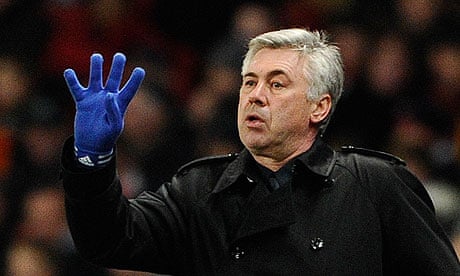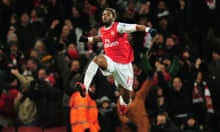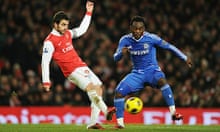While Arsenal celebrate a victory which Arsène Wenger will offer as proof that this is a team whose moment has come at last, Chelsea will be wondering if last night was the moment at which a dip turned into a decline. A return of six points from a possible 24 in their last eight Premier League games, and no wins in the last six matches, suggest that something has gone badly wrong for the champions in recent weeks.
The effort was certainly there, verging on the frenetic in the final half-hour, but it was not accompanied by a demonstration of the kind of focused power that they learnt to deploy under José Mourinho's tutelage. Rather than relying on a series of carefully drilled responses, they were reduced to making it up as they went along, and never achieved sustained coherence.
Roman Abramovich will not have been impressed and the result will do little for Carlo Ancelotti's standing. It may be that even last season's league and cup double will not be enough to save him if there is a continuation of the team's present disjointed form, such a contrast with the imperious manner in which they began their defence of the championship.
Ancelotti was in a self-critical mood afterwards. "We have gone to sleep," he kept saying. "We have to wake up. Maybe I have to be the first to wake up." But if the team and their manager could not rouse themselves for a trip to the Emirates in their present position it is hard to see from where the wake-up call will come.
The manager could point to injuries to key players in recent weeks – John Terry, Frank Lampard, Didier Drogba, Alex, Michael Essien, José Bosingwa and Yuri Zhirkov among them – but so well resourced a club must expect to ride such losses without forfeiting their ability to maintain a challenge at the top. More worrying is the loss of a sense of structure within the team.
When Ancelotti referred to the inability of the players to build on their solid defensive work in the first half by making a solid transition from defence to attack, he was emphasising the extent of the team's fall from grace. This was the dimension of the game in which Mourinho made them so formidable, as he had done with Porto and would do with Internazionale. They retained the habit through other men's brief reigns, and even through Ancelotti's own first season, but the patterns are starting to look threadbare.
Most of the big names are now restored to fitness. Lampard was making his first start for Chelsea since 28 August, hoping to rekindle some of the qualities of imagination and unpredictability that have been so clearly lacking. Ancelotti should be concerned that the team leans so heavily on a 32-year-old, albeit one whose 317 league games in the blue shirt have produced 106 goals.
One day the 17-year-old Josh McEachran will inherit Lampard's role. But were McEachran an Arsenal player, no doubt he would already be making regular starts in big games. Last night Wenger sent out a side including no player over the age of 27, and with an average of 23 and a half. Ancelotti, by contrast, picked six players in their thirties in a team averaging three years older than their opponents. There was never a sense that youthful zest would be forced to bow to guile and experience.
When Lampard began his prolonged period on the treatment table, he had started Chelsea's first three Premier League matches of the season, after which the defending champions' record made fine reading: played three, won three, 14 goals scored and none conceded. At that stage, as Wenger remarked in his programme notes for last night's match, they looked unbeatable.
Any side would notice the absence of a midfielder whose habit is to score 20 goals a season, and the midfield trio of Michael Essien, Mikel John Obi and the Brazilian newcomer Ramires certainly missed Lampard's contribution, notably his knack of timing his arrival on the edge of the opposition penalty area to maximum advantage and the way he unobtrusively lubricates the movement of others. Last night, however, Lampard's priorities were elsewhere.
As Arsenal set out to swamp the visitors' rearguard with fast, fluid, one-touch passing moves, he was often occupied in helping Ashley Cole to resist the incursions of Theo Walcott. Only when that duty had been fulfilled was he able to turn his attention to breaking forward and supporting Chelsea's three forwards.
But it was too much to expect that, after only one brief appearance as a substitute at White Hart Lane a fortnight ago, he would be back to top form. One sumptuous pass out to Salomon Kalou in the opening 10 minutes apart, he had little to offer in the attacking areas and ended up in the referee's notebook for a scruffy foul on Alex Song shortly after Branislav Ivanovic had pulled a goal back. That was how it went for him, and for a Chelsea side whose chance of retaining their title, even in this unusually volatile season, may already have gone.




